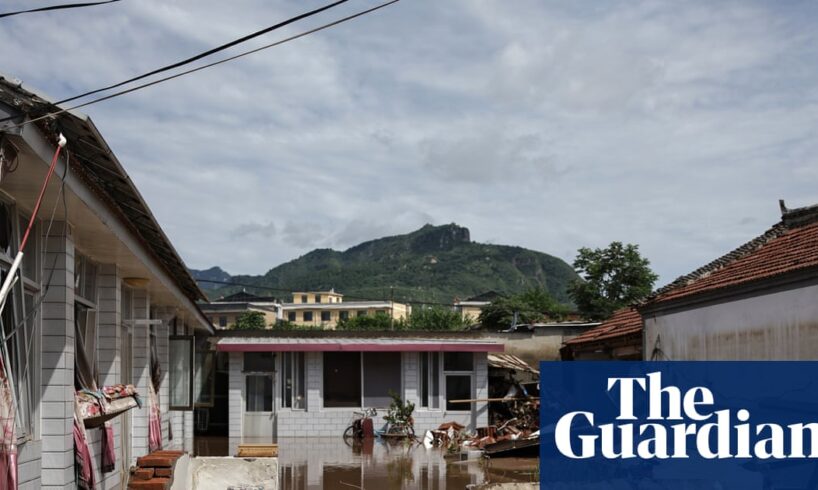
Wang Rongying was lying in bed at 6pm on Monday evening when her phone started pinging with messages. Neighbours said that the heavy rainfall Wang could hear outside was starting to cause the water levels on the street to rise to worrying levels. When she opened her front door to see for herself the flood water came rushing in.
“I was so scared … never since the 1980s have I seen such heavy flooding. We didn’t receive any warning in advance,” Wang said, surveying the soaked remains of her two-storey home in Miyun, a district on the outskirts of Beijing that was hit by heavy floods on Monday evening. By midnight, 28 Miyun residents were reported to have died.
“I feel grateful to be alive,” said 71-year-old Wang on Tuesday afternoon, still wearing her muddy clothes from the night before.
Wang Rongying at home in Miyun, which was hit by flooding this week. She was rescued from her rooftop after several hours. Photograph: Amy Hawkins/The Guardian
Like many of her elderly neighbours, Wang found refuge on her rooftop, where she waited for several hours to be rescued by emergency services. She waved a red piece of clothing to help rescue workers spot her more easily. At about 11pm, she was found and taken to an overnight relief centre where she was given sweets to help her manage her diabetes.
Warnings unheeded
The floods that hit Beijing this week saw a year’s worth of rainfall in less than seven days, and stretched the emergency services to their limits. In total, 30 people are reported to have died in Miyun and Yanqing, another mountainous district on the edge of the capital, and more than 80,000 people have been relocated. Eight people in neighbouring Hebei province were killed in a landslide caused by the rainfall. More than 130 villages lost power.
Many Beijing residents received text messages from the local authorities warning them about the risks of landslides and flash floods. But the advice to “pay attention to safety” didn’t offer much by way of specifics, and several people interviewed by the Guardian in Miyun said they either didn’t receive, or didn’t notice, the warnings.
Map
“There was only a general notification, it wasn’t very helpful,” said a 37-year-old sanitation worker, who declined to give his name, as he trawled for any valuables that might have been washed up in Miyun’s Century Sports Park. The park’s lawn had been transformed into a muddy swamp by the floods. He was working in central Beijing when he heard about the floods on Monday. “My heart flew back to my family,” he said, “I couldn’t continue with my work”. By the time he got home, the waters had receded, but all his belongings had been soaked, he said. He estimated that his financial losses could amount to 20,000 yuan (£2,100), the equivalent of several months’ salary.
Destroyed trees in Miyun’s Century Sports Park. Many people who lost belongings in the floods are not covered by insurance. Photograph: Amy Hawkins/The Guardian
Wang, like many of her neighbours, is retired and lives on a modest income. Her pension is 3,000 yuan per month. She estimated the damage done to her house and belongings, which are uninsured, will cost about 100,000 yuan. “We just need to find a way to manage,” she said, offering chunks of watermelon to anyone she spoke to. Miraculously, her two pet parakeets, chirping in their cage, and her large poster of Mao Zedong, survived the disaster.
Thanks to the climate crisis, extreme weather events are becoming more common in China. Earlier this month China’s emergency ministry said that 25 million people had been affected by natural disasters in the first half of the year. Last month, several people died in heavy flooding in the poor, south-west province of Guizhou.
In 2023, a separate district of Beijing, on the western edge of the city, was hit by the heaviest rainfall on record, which killed at least 20 people.
Fending for themselves
China’s emergency response efforts are, thanks to grim experience, becoming increasingly well-honed, but the social safety net for people who survive the disasters is minimal.
Residents walk across a flood damaged road in Miyun district on the outskirts of Beijing. Several areas remain cutoff by floodwaters. Photograph: Andy Wong/AP
Wang’s neighbour, a 69-year-old retired farmer who gave his surname as Duan, was rescued along with his wife on Monday evening by a large forklift truck deployed to collect people from their rooftops. He said that everything in his house had been destroyed, including a new air conditioning unit that he recently bought for 6,000 yuan. “It was a big spend for us,” he said. His combined monthly income with his wife is about 4,000 yuan. Like Wang, Duan does not have insurance for his belongings and doesn’t expect to receive any compensation or support from the government for his losses.
Despite the scientific consensus that links rising global temperatures with natural disasters, the two are rarely linked in Chinese official media. Ordinary people, especially in less developed areas such as Miyun, often pay little attention to concepts such as climate change.
Standing on a corner of his flooded neighbourhood, its striking mountains visible on the horizon, Duan said he had no way to reach his home as the roads had become inaccessible. He estimated the waters would take several days to subside. “I don’t think it’s related to global warming,” he said. “It feels more like a once in century event.”
Residents in the worst-hit areas of Miyun were rescued and taken to local schools and government buildings that had been swiftly converted into relief centres. But some people were left to fend for themselves.
Li Qingfa, 75, runs a small guesthouse in the same neighbourhood. He said that although he would have liked to have been relocated, his guesthouse was used as a temporary emergency relief centre.
When the flood waters started rushing in, Li and his wife grabbed bedding, bags of wheat and sacks of rice to use as makeshift sandbags, spoiling more than 100kg of grain. “The financial losses are great, but there is nothing we can do about it,” he said, as he attempted to wipe clean the muddy waters swirling over the guest room floors.
Additional research by Lillian Yang





